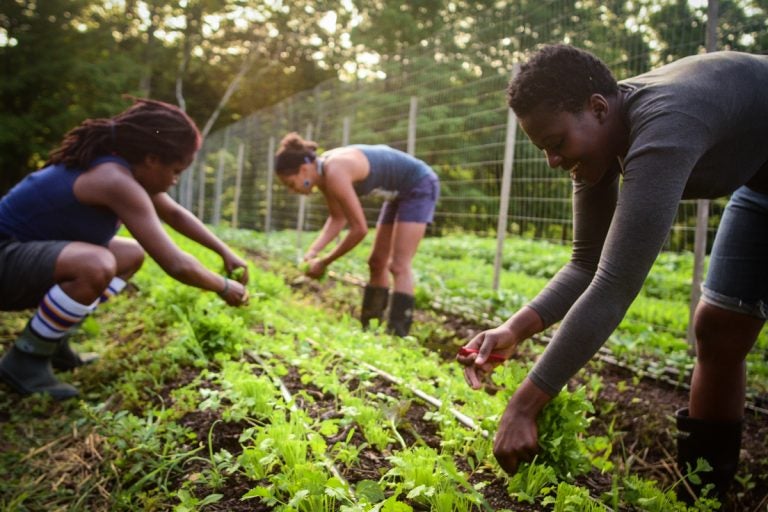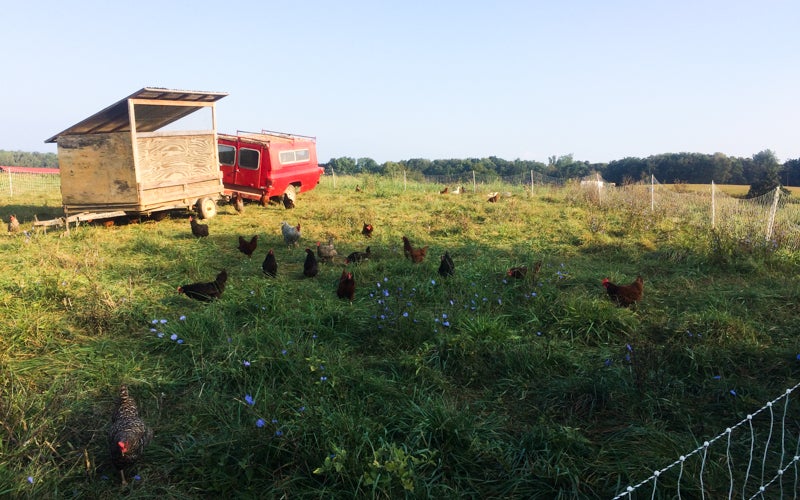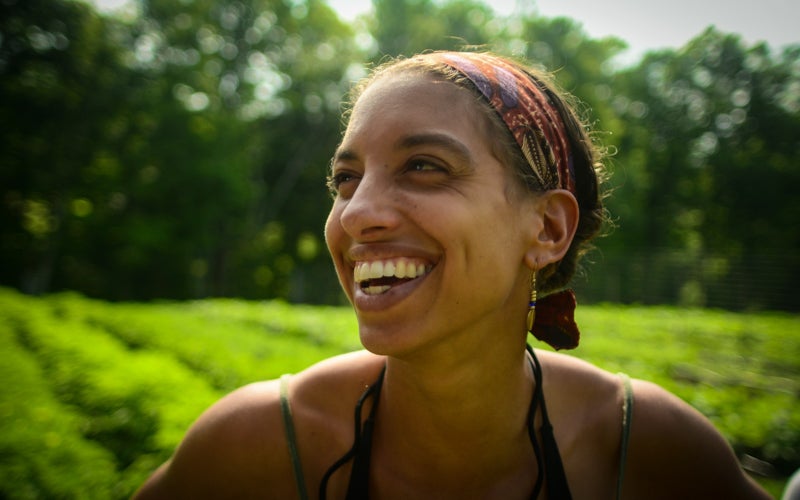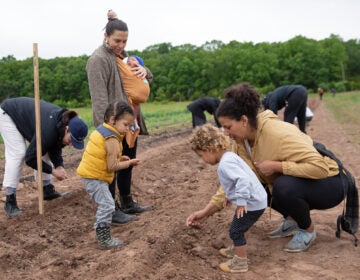Black farmers work to cultivate diversity
Farming is the second-whitest job in the United States.
Listen 0:00
Farmers pick crops at Soul Fire Farm in New York state. (Courtesy of Soul Fire Farm)
Chris Newman used to be a software engineering manager, well paid, but he worked long hours, ate fast food, and went to the doctor a lot.
Eventually enough was enough. He and his wife moved from the Washington, D.C., area to Charlottesville, Virginia, to become farmers.
“The immediate cause was to get me out from under the fluorescent light and get me outside and healthy and moving around, which is what makes me feel good,” Newman said.
Now he’s healthier, has fewer stomach problems, and he can eat dairy products again. He gets up before the sun is up, has a cup of coffee, and drives 10 minutes to work the land. He raises pigs, ducks, and chickens.
“Because I grow all this stuff, I tend to eat it. I don’t eat at Popeye’s anymore. I think it’s disgusting. I used to love Popeye’s. Now I can’t eat that crap,” Newman said. “I have a really hard time eating bad meat. I’ll eat a vegetarian dish at a restaurant if I didn’t know where the meat’s coming from.”
For him, farming is about more than just his own health. Newman hopes to encourage more people of color to become farmers and push for sustainable farming practices, so healthy food becomes accessible to those who can’t afford it.
“It’s not just about our happy damn chickens. This is about how do we fix this system,” he said.
Newman says when he switched careers, he realized how overwhelmingly white farming is in America — he felt alone as a person of color.
“You go into Whole Foods around here, you don’t see black people; you go to farmers markets, don’t see that many black people; you go to farms, don’t see any black people.”
Farming is more than 90 percent white — the second-whitest job in the United States, according to 2016 data from the Bureau of Labor Statistics.
Farm life
Newman’s chickens spend most of their lives in a large floorless pen where they can run around and forage for bugs in the grass, fertilizing the land with their waste. By design, his chickens do their business all over the field, which makes the Virginia soil more fertile.
“Animals have created this foundation where you can now, in that place, plant trees, plant crops, and they’ll be healthy without needing these injections of artificial fertilizers and chemicals, because that soil is so healthy,” Newman said.
But growing food that way is also expensive; his eggs sell for $5 a dozen.
“That is a huge thing that bothers me about what we do … a lot of my family, a lot of the people I grew up with … they can’t afford this stuff,” Newman said. “If it’s $10 a pound, it may as well be a million dollars a pound. What has to happen in order for this to be accessible to everyone is way bigger than me, is way bigger than this farm, way bigger than all the farms in central Virginia or the mid-Atlantic or anywhere else.”

He wants a lot more people like him growing food using these methods. Maybe it’s a business, or maybe it’s a hobby in a backyard or community garden so they can make money on the side.
Specifically, he wants to help more people of color get involved in farming, so they can feel the same connection to the land and health transformation that he’s experienced.
African Americans are one and a half times as likely to be obese than white people, and they eat fewer vegetables than other racial groups.
But to get more people of color interested in farming, first you have to get them interested in farming. When people find out he used to work in tech, often they say he was crazy to take an $8,000-a-month pay cut to work outside in a field.
“Even my own brother — he’s a customer of mine, he loves the food, loves what we’re doing, but when I kind of jokingly told my nephew, ‘Yeah you can be a farmer like your uncle some day, come up and join me’ — he just kind of goes, ‘Hahah, naw.’”
Training a new generation
Newman is already working with high school students, and he says you just need to get them to a farm and show them what it’s like.
But there’s a more complicated, entrenched problem — one that the vast majority of farmers don’t have.
Newman says he battles prejudice to get his work done. For instance, a couple years ago, he was driving past a rich neighborhood. He pulled his pickup truck over onto the side of the road to eat his lunch.
“This lady like jogs by, and she gives me this look, and every black man in America knows that look … it’s a mix of fear and incongruence, like, ‘You don’t belong, something’s wrong,'” he said. “And as soon as she ran by and gave me that look, I’m like, ‘The cops are going to be here in less than five minutes.’ And lo and behold, five minutes later, here comes a cop — this is not part of your beat; this is not where cops drive — slows down, looks at me, doesn’t quite stop, because again I know how to disarm white people, first thing you do is smile, you act like you own the place … you act white … change your voice, to where you code switch, and you become a lot more articulate, you … talk like kind of an intellectual … and smile, always smile.”
That’s not the only time that someone called the police on Newman. It has happened while he was working the fields, and when he was delivering food. Now he does his work differently.
“I don’t do deliveries that much anymore,” he said. “I avoid farming in places where I can be seen from the road.”
Newman is working to addressing the lack of diversity among farmers by hiring interns, focusing on women, people of color, and other underrepresented communities.
“It’s about recognizing that there are barriers there for them that there aren’t for other people and that we need that lift, because the world is not our oyster,” he said.
Last year, three years after Newman left his tech job, the farm broke even.
“I need to be that example of somebody that could leave it and viably make a living as a farmer,” he said.
Farming as a political act
Leah Penniman is also working to diversify the farming community and reconnect people to their food. She’s a farmer and activist at Soul Fire Farm on the eastern side of New York state.
A year after she started her farm, Penniman started getting calls from mostly black women around the country who told her, “I just need to hear your voice and to know that I’m not alone and to know that it’s possible to be a farmer.”
In addition to farming, she runs a training program to teach black and Latino people basic farming skills.
Demand is booming. She can train 120 people a year, and she has another 100 to 200 people on the waiting list for next year’s program.

Penniman also teaches a bit of history about the relationship black people in the United States have to the land.
“You can’t go through hundreds of years of enslavement and sharecropping and tenant farming and convict leasing and not have that trauma get imprinted into your DNA and your cultural history,” she said.
She teaches some lesser-known history as well: at first, European settlers didn’t know how to grow rice, millet, and a lot of other crops now grown in the U.S., but the Africans did.
“People who were experts in growing these crops were kidnapped so they could establish the agricultural systems. All that rice, those were African technologies; the ways of getting the swamps of Florida to produce food, those were mounding technologies that also were African technologies of how to drain out an area and make it productive,” she said.
Among black farmers who she knows, farming is not only a business; it’s a tool for social justice.
Penniman sells produce to about 260 people in her New York community. And as part of her mission, she accepts food stamps, and she’s developed a system where she can still make money — while supporting 15 percent of her customer base — even if they can’t pay in any given week.
Customers who can afford to pay more essentially help support those who don’t have the budget. She says her low-income clients get a full box of vegetables each week no matter what.
“Many people say if it weren’t for that, they would just be eating boiled pasta, because that’s the most calories for the least money,” she said.
For some people, like 22-year-old Patty in Mississippi, farming is directly political. For her, farming is a way to avoid relying on the government or industry. Patty asked that we not use her last name because her work — and opinions — have led to her being harassed online.
Two years ago, Patty and her husband started a 3.5 acre farm, where they grow radishes, cucumbers, tomatoes, rabbits, and chickens.
She worries that people have forgotten where their food comes from. She shared a story from one of her friends to show how real that fear may be.
“She took her son to school with homemade chicken nuggets, and the other kids were having store-bought nuggets. And the kid leans over to the other child and says, ‘Did you know chicken nuggets are made out of chickens?’ And all the kids started crying in the room because none of them knew that chicken nuggets come from chicken.”
Patty says if more people grew their own chickens, then they wouldn’t have to buy it as much so there’d be less demand for factory farmed chicken.
Chris Newman, the farmer in Charlottesville, Virginia, says his farm just broke even, so now they can focus on expanding; he’d like to help more people of color benefit from that and change the food system while they’re doing it.
“Looking out here, it’s the perfect metaphor,” he said. “There’s nothing but green fields ahead of us. There’s just this open-ended economic opportunity that’s just waiting for people to come back to the land.”
WHYY is your source for fact-based, in-depth journalism and information. As a nonprofit organization, we rely on financial support from readers like you. Please give today.







